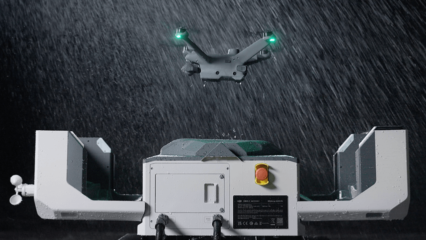BARS on UAV Aerial Works’ shoulders

Do you understand how much military and police services people love their bars?
Of course, it would be hard to understand if you have never been a member of the disciplined forces or never had a relative or a friend who has joined the uniformed services.
Raking up the numbers of those bars perching upon your shoulder gives such big daddy energy (BDE) you feel like the weight of the whole world eases a little more with each bar that gets pinned up there.
Which is to say we are imagining how the blood in the veins of folks at South African drone services company UAV Aerial Works must be overflowing with the BDE after they recently passed the Remotely Piloted Aircraft version of the Basic Aviation Risk Standard (BARS) program.
It is an achievement that has the potential to open a lot of doors for the drone services entrepreneur to work with companies that are members of the Flight Safety Foundation’s (FSFL) the organisation that is the custodian of the BARS program – without having to individually undergo risk assessment tests with each new client.
It is a big deal indeed, and UAV Aerial Works spent the past few months working hard to earn their BARS; now that they’ve got them, they have earned the right to celebrate.
“We are thrilled to announce that UAV Aerial Works is now BARS registered,” said UAV Aerial Works Director, Kim James.
“Aerial Works was audited in person by a registered Audit Company and accredited Auditors, who provided an evaluation of our operation.
“It was an in–depth audit with the objective of clearly articulating and verifying what procedures, processes and systems we have in place for operations in (BVLOS, Night Operations, Operations above 400ft AGL and Operations over Populous areas/crowds).
“This is over-and-above our (South African Civil Aviation Authority) SACAA regulatory-required processes already in place.
“With our drone security and mining operations expanding at a rapid rate, we thought it prudent to hold ourselves to higher safety standards and to be able to meet client requirements.”

We have explained the BARS programme here before, when another drone services company earned theirs; but just to repeat; here is the Flight Safety Foundation’s explanation of what their package entails.
“In the past, Resource companies each had their own aviation safety standards and would engage aviation service providers to transport staff to work sites at their own expense. There was no single industry aviation standard to manage their aviation risk. The variety of standards meant that aircraft operators underwent multiple annual audits, creating unnecessary burden.
“There was no formal process by which safety audit results, accident data or safety findings could be shared between the companies or across the resource industry.
“In 2010, resource industry giants BHP and Rio Tinto came together and approached the Flight Safety Foundation (FSFL) as an independent, impartial not-for profit organisation to collaborate in establishing a global aviation safety assessment and audit protocol (The BAR Standard).
“The twelve founding BARS Member Organisations then worked with FSF over twelve months to develop the BARS Program and turn it into an award-winning International Aviation Safety Program.
“The BARS Program has (since) grown in membership and expanded from the resource and mining sectors to include government, insurance, commercial, defence and humanitarian organisations who also conduct global aviation activities in remote locations.
“It is active worldwide, with aircraft operators in contracted aviation services represented throughout every continent. The Audit Program is supported by training elements, data analysis and a suite of aviation Standards covering helicopter external loads, remotely piloted aircraft systems, offshore helicopter operations, night vision goggle operations, emergency medical services operations, aerial geophysical survey activities, aerial mustering and air dropping.”
And because a lot of member companies and organisations are now hiring the services of drone technology for various operations, the FSFL saw it fit to extend its audit programme to unmanned aircraft.
“The Basic Aviation Risk Program (BARS) has developed the RPAS Audit and Registration Program to complement the RPAS Standard and provide a more efficient means of monitoring, assessing, and analysing risks associated with RPAS/Drones/UAV,” the organisation says.
“It’s no secret that the use of RPAS vehicles onsite comes with risks. Accidents happen and when they do, they can lead to expensive damage to property, major delays and interruptions, injury, and even death.
“An RPAS Audit using registered BARS Audit Companies and accredited RPAS Auditors provides an evaluation of operations and technical management systems of an RPAS operator. It is an in–depth audit with the objective of clearly articulating and verifying what procedures, processes and systems the RPAS operator has in place to mitigate risk.”








0 Comments